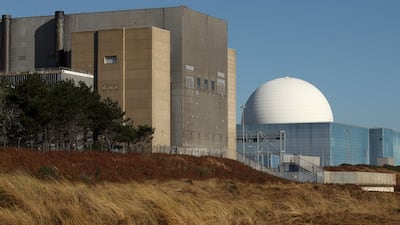The UK is to invest £14.2 billion ($19.2 billion) to help build a nuclear power plant as well as a series of small modular reactors.
The government said the Sizewell C nuclear reactor would help deliver “a golden age” of abundant clean energy. Britain opened the world’s first commercial nuclear plant at Sellafield, Cumbria, in 1956 but has not completed one since 1987, which was the Sizewell B plant.
The proposed plant in Suffolk has been on the drawing board for more than a decade, and Tuesday’s funding announcement comes on top of billions of pounds already pledged during its development. The eventual price tag for construction may surpass £40 billion.
Even with the government allocation, Sizewell C still needs a final investment decision that depends on private funding. Ministers are thought to be aiming to sign up investors during next month’s Anglo-French summit in London.
The government also confirmed one of Europe's first small modular reactor programmes and will invest £2.5 billion over five years in fusion energy research. It said the outcome of the bidding competition is the first step towards reducing costs and unlocking private finance to deliver one of Europe’s first small modular reactor fleets.
Rolls-Royce SMR has been selected as the preferred bidder, with hopes that the smaller plants will be quicker to build than traditional nuclear power stations.
Great British Energy – Nuclear will aim to allocate an SMR site later this year and connect projects to the grid in the mid-2030s.
The government has already announced planning reforms to make it easier to build nuclear projects, including small modular reactors, across the country.
Energy Secretary Ed Miliband said new nuclear power capacity would get the UK off the “fossil fuel rollercoaster”.
Mr Miliband said: “We need new nuclear to deliver a golden age of clean energy abundance, because that is the only way to protect family finances, take back control of our energy, and tackle the climate crisis.
“This is the government's clean energy mission in action – investing in lower bills and good jobs for energy security.”
He said electricity demand was expected to at least double by 2050 and that expert advice says nuclear has an important role to play in the energy system.
“In any sensible reckoning, this is essential to get to our clean power and net-zero ambitions.”
Simon Bowen, chairman of Great British Energy – Nuclear, called the Rolls-Royce announcement a “defining moment” for the UK’s energy and industrial future.
“By selecting a preferred bidder, we are taking a decisive step toward delivering clean, secure, and sovereign power,” he said.
Nuclear plants are seen as increasingly important electricity sources as the government tries to decarbonise Britain's grid by 2030, replacing fossil fuels with green power.
But spiralling costs and years-long approval processes make it difficult for the country to attract the money necessary to replace ageing reactors.
The new investment in Sizewell C, on England's east coast, is part of the wider spending review that Chancellor of the Exchequer Rachel Reeves will unveil on Wednesday. It will cover all parts of government, ranging from the National Health Service to the military.
The latest spending for Sizewell C raises the government’s total commitment to £17.8 billion.
The 3.2-gigawatt plant will generate enough electricity for six million homes and create 10,000 jobs, according to Ms Reeves’s announcement.
It is a copy of French state-owned EDF's Hinkley Point C plant, which is years behind schedule and has cost billions of pounds more than planned. That plant is expected to produce enough power for about six million homes when it opens, but that may not be until 2031.
The development of Sizewell goes back to local consultations that began in 2012. Since then, different UK governments have worked to find a way to finance the project, ultimately choosing a hybrid model of public and private capital.
Britain first took a stake in 2022 when it bought a 50 per cent share held by China General Nuclear Power Corp. The government subsequently became the majority owner when EDF pulled back.
Trade unions welcomed the funding for Sizewell C, which the Treasury said would create 10,000 jobs, including 1,500 apprenticeships. The GMB union said the move was “momentous”.
But the head of a campaign group opposing the plant criticised the decision to commit the funding, saying it is still not clear what the total cost will be.
Alison Downes of Stop Sizewell C said ministers had not “come clean” about the full cost of the project, which the group have previously estimated could be about £40 billion.


